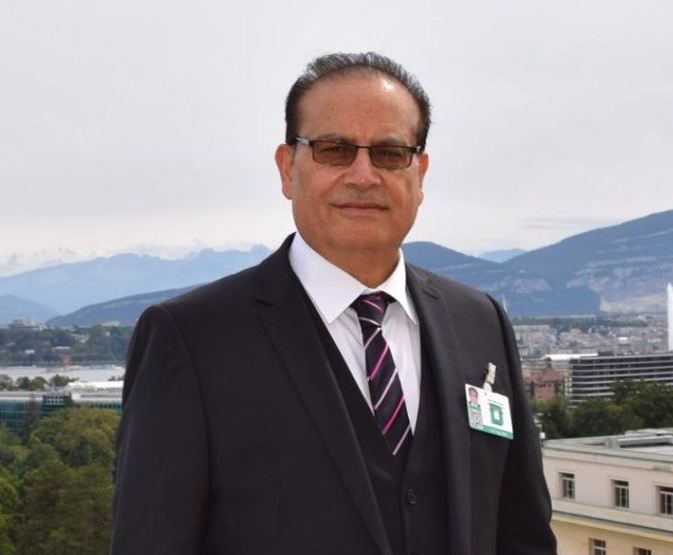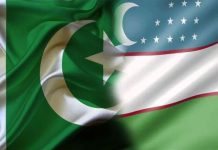By: Qamar Bashir
Macomb, Detroit, Michigan
While China has imposed retialory tariff from 10% to 15% on the US imports, for the first time in U.S. history, Secretary of State Marco Antonio Rubio openly acknowledged that China is a great power and is poised to provide global leadership in the near future. He recognized China as the largest trading partner of the United States and likely to remain so for the foreseeable future. Unlike the traditionally hawkish stance of many U.S. lawmakers, Rubio outlined a more measured and pragmatic approach to managing China’s rise, focusing on strategic containment rather than outright confrontation.
Rubio further emphasized that the future of the 21st century will be largely defined by the relationship between the United States and China. While acknowledging China’s economic growth and global influence, he warned against allowing it to dominate entire regions or monopolize essential industries such as manufacturing, energy, critical minerals, and medicine. Dependence on China for these sectors, he argued, would weaken America’s self-sufficiency and national security, making it imperative to prevent Beijing from gaining control over key industries like telecommunications and the automobile sector.
Rather than suppressing China’s influence, Rubio advocated for a balanced and fair global order where U.S. independence and strategic interests are not compromised. He underscored the need for economic diversification, domestic industrial strengthening, and global partnerships to counterbalance China’s rising dominance.
Rubio also acknowledged China’s legitimate right to pursue its national interests, just as the U.S. does, signaling a shift from the confrontational rhetoric notably, while Canada and Mexico faced 25% tariffs, tariffs on China were limited to 10%, suggesting a carefully measured approach that considers China’s strategic importance in global trade and economic stability.
Rubio rejected the notion of taking control of panana Canal by the USA, and adopted a conciliatory tone, by saying that he is a diplomat and believe in resolving the outstanding issues by diplomatic means and rather than using kinetic force. Though he expressed concern that Chinese-linked companies controlling key entry points could violate treaty terms and disclosed that the Panana leadership will seriously consider withdrawal from the China’s Belt and Road Initiative and would initiate legal processes required for further changes to keep the canal open, free, and free from foreign influence that could pose risks to U.S. security, but striking a diplomatic tone made it clear that while direct U.S. operational control of the canal is not the immediate goal, decisive action is necessary to prevent any foreign power from using the canal strategically against American interests.
Regarding foreign aid, Rubio dismissed concerns that China would fill the gap left by the freezing of USAID funds, asserting that China has the right to pursue its policies as it sees fit. However, he questioned why the U.S. should fund initiatives that do not align with its national interests. He emphasized that U.S. taxpayer money should not be spent on programs that do not strengthen America’s security, economy, or strategic standing.
On trade policies, Rubio acknowledged that China acts in its national interest and, if allowed to take advantage of the U.S., would continue to do so. The U.S., he asserted, must ensure fairness in economic relations and not allow China to maintain an unfair advantage. While this stance may face criticism in political and media circles, he noted that millions of Americans recognize the logic behind ensuring economic reciprocity with China.
Rubio’s remarks reflected a shift from aggressive confrontation to strategic recalibration in managing U.S.-China relations. He emphasized the need for economic and strategic independence while acknowledging China’s global influence. His approach suggests a nuanced policy—one that seeks to establish a balanced relationship with China while safeguarding American interests through economic diversification, fair trade practices, and strategic policy adjustments.
The U.S. approach to tariffs on China, imposed on February 4, 2025, was notably cautious compared to what many observers had anticipated. While a 10% tariff was applied to all Chinese imports, amounting to $427 billion in goods and generating an estimated $42.7 billion in duties, this was significantly lower than the straight 25% tariff imposed on imports from Canada and Mexico. The disparity in tariff rates suggests a measured approach toward China, likely aimed at maintaining economic stability and avoiding excessive disruption to global trade.
In retaliation, China imposed tariffs on U.S. exports valued at approximately $20 billion, which appeared more symbolic than economically damaging. These measures included a 15% tariff on U.S. coal and liquefied natural gas (LNG) and a 10% tariff on crude oil, agricultural machinery, and vehicles.
While these tariffs target key U.S. industries, they remain limited in scope compared to the broader U.S. tariffs on Chinese goods. This exchange of tariffs reflects a strategic balancing act, where both nations are asserting their economic positions while avoiding full-scale trade escalation.
The approach adopted by Secretary of State Marco Rubio is both commendable and strategically sound. Following President Trump’s return to office, there were widespread concerns that the U.S. would adopt an aggressively confrontational stance toward China, potentially escalating global tensions. However, Rubio’s measured and pragmatic approach has reassured the international community, signaling that the U.S. is opting for strategic engagement rather than outright hostility.
If Rubio’s statements accurately reflect the stance of President Trump, it suggests a significant shift in U.S. policy—one that acknowledges China as an equal partner, respects its economic and military strength, and moves away from a policy of obstruction toward one of competitive coexistence.
This approach is not a sign of weakness but rather a recognition of geopolitical realities. The U.S. is asserting its national interests while allowing China to do the same, a principle fundamental to global diplomacy.
By refraining from aggressively opposing China’s rapid rise and instead focusing on maintaining a fair and balanced global order, the U.S. is fostering an environment conducive to economic progress and stability.
This shift has the potential to accelerate global development, benefiting not only the U.S. and China but also the rest of the world. If this pragmatic policy is consistently applied, it could mark the beginning of a new era of economic cooperation and strategic competition—one that prioritizes national interests without undermining global peace and progress.
By: Qamar Bashir
Press Secretary to the President (Rtd)
Former Press Minister at Embassy of Pakistan to France
Former MD, SRBC












